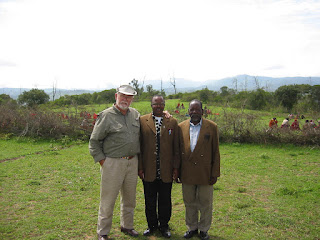In past weeks I have typed up several blog entries about men and
women who at the age of 60+ years were willing to take on new and
bigger-than-ever Gospel centered ventures, i.e. John Shepherd and CRM.
Well as much as I loved John, and do love Blaine and Deloris
Anderson and Alan and Peggy
 |
| Blaine Anderson, Josiah Mwesha and Simeon ole Litik |
McAlister, my #1 hero in the 60+ crowd is a
short, unassuming Maasai of Kenya named Simeon ole Litik.
There are so many wonderful stories one could write about the
exploits of this brother that indeed a novella would be required. I wish
Simeon's son-in-law, and my dear friend, Richard Ntekese, would
undertake such a project. I know I would pay good money to buy and read
it.
I will relate one as briefly as I can.
Around 2001, Herb Cady invited Blaine to travel to
Marlal, Kenya, where
he was working among the Samburu, and bring Simeon and Josiah Mwesha, so
they could share the Gospel with older Samburu men. Herb had heard of
the success Blaine had been having among older Maassi men, and since the
Maassi and Samburu are so close linguistically and culturally, Herb
figured they could have an impact.
The road
between Nairobi and Marlal was at the time so bad I chose to fly those 3
there. Upon there arrival at the dirt air strip, Herb told Simeon and
the others an interesting story; one that would play a very important
rile in what would happen in the next few days.
Herb related that the Kenyan government had recently made good on
their threat to evict all Samburu families living on the reserve the
government had set aside in Samburu-land for a national park. Thus
hundreds of Samburu families were at that time scrambling to find
another place to live.
When those displaced
men heard some older Maasai men were coming to visit, they said to Herb
"maybe they are coming to remove the curse of our common ancestor from
us.". As I recall, I do not think Herb fully understood the meaning of
that statement, but he figured Simeon would.
So as Herb drove his visitors to his house, he relayed this piece of
info. Sure enough, Simeon then told all in the car the full story as it
had been passed down from one generation to another.
At this point in time, here on the AT, I cannot remember all of
the
story's details. However the major facts are these. The Maasai and
Samburu had a common ancestor. The mother of all Samburu was this man's
second wife. The son's of this wife did something which greatly angered
their father. So the elder sent off the wife and her children and
pronounced a curse upon them as he did so. The curse involved a number
of factors, but one prominent feature stated that they should be
wanderers on the earth without a final home. Now one can see the strong
connection to the Samburu's current context of being forced off their
land.
So after dropping off his guests at his
house, Herb traveled to a particular place and made a plan with locals
for Samburu elders to gather there to greet the Maassi and hear the
message they had brought.
The venue was on a
hillside and on the appointed day for the meeting the hill was covered
with
red shukas ( blankets), the standard outerwear of Samburu and
Maasai.
When Simeon spoke, he in essence told
them they had not come to remove the curse of their common ancestor,
but rather to bring news about how the Samburu could escape from the
consequences of the only curse they need really fear: the curse which
God Almighty has pronounced on sin, sinners and even on creation.
Simeon then preached the gospel by explaining the basic story line
of the Bible, culminating with the perfect life, death and resurrection
of Jesus. The response of the Samburu hearers was overwhelming.
Simeon was a consistent 60+ year old example of being ready "in
season and out of season" to go wherever God sent him to share the Good
News. And for the 11 years I was blessed to minister alongside him, he
consistently challenged me by his passion and willingness.
Uncle



